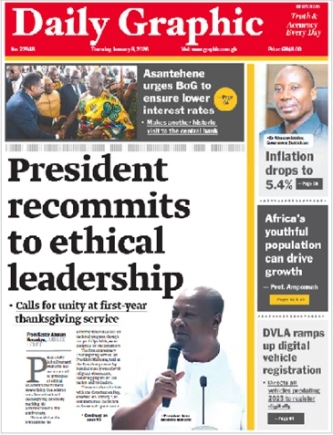![Maj. Derrick Oduro (retd) [inset] addressing participants in the opening session of the course in Accra Maj. Derrick Oduro (retd) [inset] addressing participants in the opening session of the course in Accra](/images/2016/JULY/JULY12/major.png)
Course on conflict management underway in Accra
The Ranking Member on Defence and Interior in Parliament, Major Derrick Oduro (Retd), has noted that the devastating effects of conflicts in neighbouring countries and other parts of the world must be a wake-up call for the country to roll out a comprehensive conflict and disaster-management system.
Accordingly, he has called for a multi-faceted approach through inter-sectoral collaborations to build strong mechanisms that would boost early warning signals and identification of conflict situations, so that they could be prevented.
“Early warning and identification mechanisms are essential in preventing conflicts. It is, therefore, worthy to note that there may be certain economic, environmental, social or even financial antecedents that need to be addressed early, so that they do not escalate into conflicts,” he stressed.
Training course
Major Oduro made these observations at the opening session of a two-week course on Conflict and Crisis Management under the auspices of the Ghana Armed Forces Command and Staff College (GAFCSC) in Accra yesterday.
Participants were drawn from the GAFCSC, the Ghana Police Service, other security agencies, ministries, departments and agencies (MDAs), the media, as well as military officers from neighbouring West African countries.
Its objective is to provide the participants with a clear understanding of conflict and internal crisis management to make for their effective performance.
The course is also designed to equip the participants with knowledge on the causes and consequences of conflicts, as well as the skills to respond in a comprehensive and cohesive manner to such situations.
Conflicts and national development
Major Oduro said the efficient management of conflicts and disasters had a direct bearing on socio-economic development, adding that failure to put in place the right measures to respond appropriately would be a drawback to national progress.
“On the local front, the frequent boat accidents on the Volta Lake, fire outbreaks and perennial floods in Accra remind us that we need to prepare for disasters,” he said.
He urged the participants to come up with recommendations that would form the basis for an engagement between policy makers and stakeholders.
Building capacity
A Senior Research Fellow at the Legon Centre for International Affairs and Diplomacy (LECIAD), Dr Vladimir Antwi-Danso, who spoke to the Daily Graphic outside the main event, stressed the need for the country to build the capacity of its human resource to deal with conflicts.
“No country exists without conflict or crisis. In our case, we have not had a major crisis situation, but there are pockets of conflicts. It could be chieftaincy crisis, election-related violence, land conflict, among other issues. We need a more comprehensive way to deal with such situations,” he said.
He said dealing with conflicts demanded skills and training in conflict management and prevention and added that the best way to deal with conflicts was to minimise its effects by putting structures in place to ensure that they did not occur.
“Conflicts and crisis are part and parcel of our daily life. The most important thing, however, is that we need to prepare and put in place mechanisms that will mitigate their impact on society,” he said.
 Click the link to read your copy.
Click the link to read your copy.